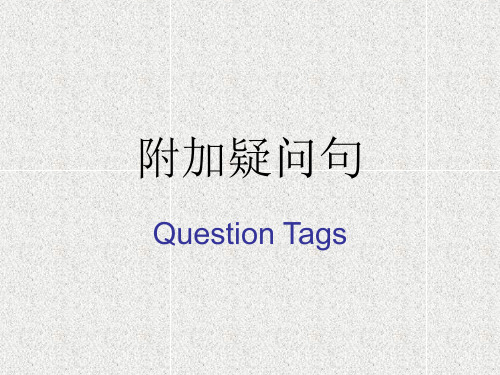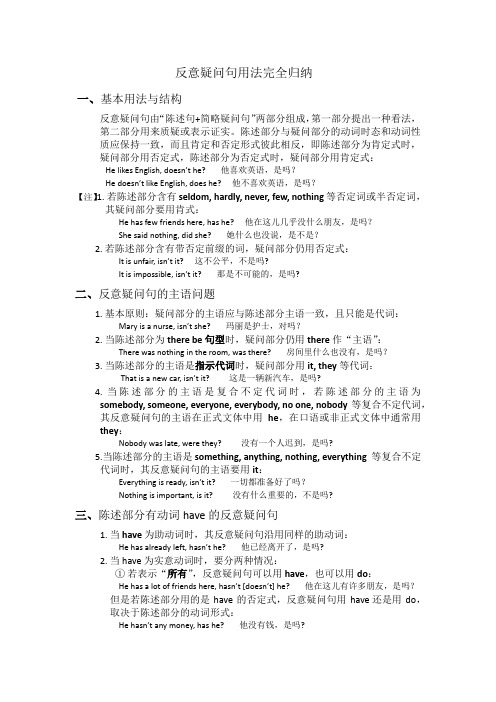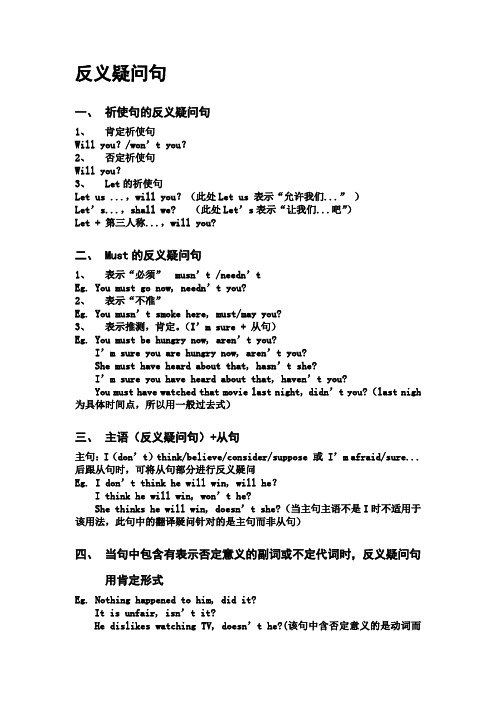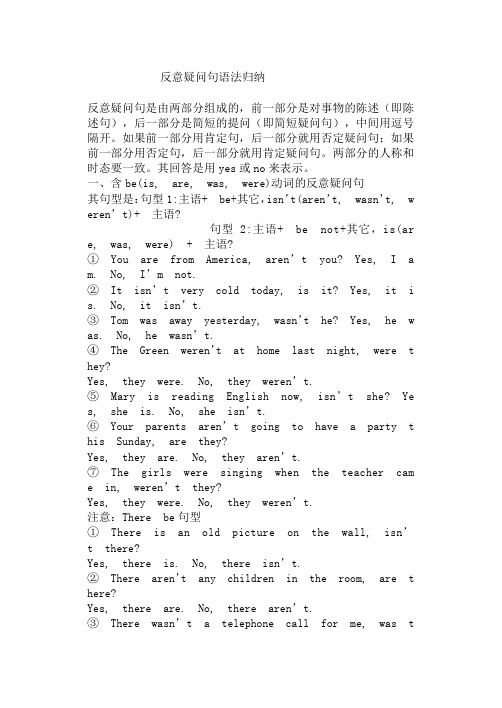反义疑问句及后置定语
反义疑问句(最全)

5.陈述部分有would rather +v.,疑问部分多用 wouldn’t +主语。 He would rather read it ten times than recite it, wouldn’t he? 6.陈述部分有you’d like to +v. 疑问部分用wouldn’t + 主语。 You’d like to go with me, wouldn’t you? 7.陈述部分是“there be”结构时,疑问部分用there省 略主语代词。 There is something wrong with your watch, isn't there? There will not be any trouble, will there? Note: 当为“ there used to be…”句型时,反意问句用 didn’t there。
b. 带有定语从句,宾语从句的主从复合句,疑问部分谓 语根据主句的谓语而定 He is not the man who gave us a talk, is he? He said he wanted to visit Japan, didn’t he?
c. 上述部分主句是由谓语think, believe, expect, suppose, imagine等引导的宾语从句,疑问部分与宾语 从句相对应构成反意疑问句 I don't think he is bright, is he? We believe she can do it better, can't she? Note: 但此时主语必须是第一人称。如果不是,则不能否定从 句。 He thought she was wrong, didn't he? 而不能说wasn't she?
初中英语反意疑问句规则

初中英语反意疑问句规则
初中英语中,反意疑问句的规则如下:
1.反意疑问句是由一个陈述句和一个简短的疑问句组成的,两者用逗号分隔。
2.如果陈述句是肯定的,反意疑问句的疑问部分就使用否定形式;如果陈述句是否定的,疑问部分则使用肯定形式。
3.如果陈述句中使用了情态动词或助动词,疑问部分使用这些词的原形,并且在句末加上主语。
4. 如果陈述句中没有情态动词或助动词,疑问部分使用
do/does/did加上not或短语动词中的not,并且在句末加上主语。
5. 如果陈述句中有两个主语,疑问部分使用which而不使用who。
6.如果陈述句中有其中一种程度的副词或表示祈使句的动词,疑问部分使用这些词,并且在句末加上主语。
以下是一些例句:
1. You don't like ice cream, do you?
2. He can't swim, can he?
3. She has finished her homework, hasn't she?
4. They didn't go to the park, did they?
5. Tom and John are playing basketball, aren't they?
6. Be careful, will you?。
初中反意疑问句的知识

反义疑问句反义疑问句,即附加疑问句。
它表示提问人的看法,没有把握,需要对方证实。
反义疑问句由两部分组成:前一部分是一个陈述句,后一部分是一个简短的疑问句,两部分的人称时态应保持一致。
1.陈述部分肯定式+疑问部分否定式,可记为前肯后否。
后半部分为:be/do/does/did/have/has/情态动词+not +代词?如:They don’t work hard, do they?2.陈述部分否定式+疑问部分肯定式,可记为前否后肯。
后半部分为:be/do/does/did/have/has/情态动词+代词?如:They work hard, don’t they?注意:(1)陈述部分的主语是everything, anything, nothing, something不定代词指物时,附加疑问句中主语用it 。
如:Everything is ready, isn’t it ?(2)陈述部分的主语是this,that,或those,these时,附加疑问句中主语用it和they.如:This is an apple, isn’t it?Those aren’t his books ,are they?(3)陈述部分的主语是everyone,everybody,someone,somebody nobody , no one ,anybody anyone 不定代词指物时,附加疑问句中主语一般用he/they.如:Nobody was here yesterday ,was he / were they?(4)陈述部分的主语是不定式,动名词,其他短语,附加疑问句中主语一般用it。
如:Reading in the morning is important , isn’t it?(5)当陈述部分有no, never,, hardly(几乎不),few,little,nobody, nothing 等否定意义的词时,后面的反意疑问句则为肯定形式:如:There are few apples in the basket, are there?He can hardly swim, can he?(6)当陈述部分含有否定意思的词是unhappy, dislike, unfriendly等含有否定词缀的词,也就是有un-前缀、-less后缀等含有词缀而意思否定的词,当做肯定句处理,疑问部分要用否定形式。
英语反意疑问句用法归纳总结

英语反意疑问句用法归纳总结英语反意疑问句用法归纳总结一、反意疑问句的一般情况1(当陈述部分的主语是:等everyone, everybody, someone, no one, nobody, somebody合成代词时,附加疑问句的主语非正式文体中往往they用。
(也可以按语法一致原则用单数。
) 2(当陈述部分以one不定代词做主语时,附加问句的主语在正式常场用one,非正式场合用he。
3(当陈述部分的主语是不定式、动名词、从句、this或that,附加疑问句的主语用it。
(是those, these则用they)4(当陈述部分的主语是表示物的不定代词everything, anything, nothing等,附加问句的主语用it。
5(陈述部分带有否定词或半否定词,例如:never, hardly, scarcely, seldom, no, none, no one,rarely, nowhere, nothing, nobody, few, little等,附加疑问句的动词要用肯定形式。
6(如果陈述部分中的否定词仅带有否定的前缀或后缀,那么该陈述句应作肯定句处理,附加疑问句应用否定形式。
二、常见句型的反意疑问句7(当陈述部分是there be 存在句型时,附加疑问句的主语也用there。
8(感叹句的附加疑问句,其谓语要求用否定句。
9(祈使句后面的附加疑问句问题A) 祈使句是否定形式,附加疑问句只能用will you。
附加疑问句用肯定、否定均可。
B) 祈使句是肯定形式,C) Let开头的祈使句要注意:1.Let’s 在意义上包含谈话的对方在内,表示提出建议或征求对方意见,其反意疑问句往往用shall we。
2. Let us 在意义上一般不包含谈话的对方在内,表示请求对方允许做某事的含义,let 有allow的意思。
附加疑问部分用will you。
3. Let me 开头表示请求,附加疑问句用will you,或用may I。
反义疑问句讲解

反义疑问句讲解进入高中之后,大家要学习的语法知识就更多了,反义疑问句就是大家要学习的语法之一。
在考试中大家经常会接触到这个语法,所以对于反义疑问句的掌握也是非常重要的。
今天小编就和大家一起分享该语法的讲解。
虽然说,在高中考试中,阅读题的分数占了总分数的很大一部分,但是对于语法的考察也并不少。
大家最熟悉不过的就是单项选择题了,单选题主要考察大家的就是对于各种语法和词汇的运用了。
反义疑问句就是语法考察的一个重点内容。
其实该语法涉及到的内容是非常多,不同情况下的反义疑问也是不同的,在考试中,大家也会遇到不同的情况,所以大家就要对每一种情况都非常的了解。
只有这样,才能在考试的时候做到不管从那个角度考察大家,大家都能够轻松的去做答。
首先大家要了解什么是反意疑问句,它主要是表达什么的?下面小编就和大家一起分享:陈述部分和疑问部分要么前肯后否,要么前否后肯。
这类句子有时带有感情色彩,表示惊奇,愤怒,讽刺,不服气等。
例如:You call this a day's work,don't you?你说这就叫一天的活儿,不是吗?由此大家可以看出,这类句型和它的名字一样,是表示反问别人的,带有很浓的感情色彩。
一般来说都会在选择题中考察大家,有些时候也会在完形填空中考察。
下面就是针对不同情况的反义疑问句的讲解:一、当陈述部分是祈使句时:1、肯定祈使句时,疑问部分用will you 或者won’t you..Close the door, will you / won’t you?2、否定祈使句时,只用will you.3、以let’s 开头的祈使句用shall we.4、以let us 开头的祈使句用 will you.5、以let me 开头的用 may I / will you.二、当陈述部分为并列句时,附近疑问句应采用就近原则,与最后一个分句相一致。
I help Lucy with her Chinese ,and she helps me with my English, d oesn’t she?三、当陈述部分为主从复合句时:1、疑问部分须与主句保持一致:He says his mother didn’t feel well, doesn’t he?2、当陈述部分是 I think I believe I guess 等主句后跟that 从句时(主句的主语必须是I)疑问部分应和从句保持一致,并且要注意否定的转移:I believe he will pass the exam, won’t he?I don’t think he will pass the exam, will he?四、部分特殊简单句的反意疑问句:1、陈述部分是 I am 时,后面用aren’t I.2、陈述部分含有否定前、后缀构成的词时,作肯定句处理,疑问部分用否定:Tom is unhappy today, isn’t he? She is careless ,isn’t she?3、陈述部分含有never nothing hardly neither little few no nobody no ne too…to… no one等表示否定意义的词时,疑问部分用肯定形式:She has no money to pay for it, does she ?4、以there 开头的陈述句有两种情况:(1)、there be 句型时,疑问部分的主语用there,There are some books on the table, aren’t there?( 2)、当以表示“地点”的there 引导时,要用陈述句真实主语的相应代词形式作疑问部分的主语,常有这两个句型:There l ive…… There stand……There stand two trees on the hill, don’t they? There lived a poor old man in the woods, didn’t he?5、陈述部分出现had better 句式时,后面仍用had 构成疑问部分。
(完整版)英语语法:反义疑问句专项讲解.doc

(完整版)英语语法:反义疑问句专项讲解.doc反义疑问句一、反义疑问句又叫附加疑问句。
反义疑问句由两部分组成:前一部分是一个陈述句,后一部分是一个简短的疑问句,两部分的人称时态应保持一致。
1.陈述部分为肯定式 + 疑问部分为否定式(如果陈述部分的否定词带有否定前缀,那么,该陈述部分作肯定处理,附加疑问部分一般仍用否定形式)e.g. She was ill yesterday, wasn’ t she?Tom dislikes the book, doesn’ t he?2. 陈述部分为否定式+ 疑问部分为肯定式(陈述部分用no, nothing, nobody, never, few, seldom, hardly, rarely, little等否定或半否定含义的词时,疑问部分用肯定式。
)e.g. He can ’ t ride a bike, can he?Some plants never blown ( 开花 ), do they ?二、附加疑问句(一)主语的选择1.陈述部分的主语是I ,疑问部分要用aren't I.I ’ m as tall as your sister, aren't I?注:当陈述部分的主语是I,而句子又用来征询对方的意见时,附加疑问句中的主语用you。
如:I find English very interesting, don’t you?I don ’t like that film, do you?2.当陈述部分的主语是everybody, everyone, someone, nobody, no one, somebody 等合成代词时,附加疑问句中的主语通常用they,亦可用 he,如:Somebody phoned while I was out, didn’t they?Everyone enjoyed the party, didn’t they?Nobody wants to go there, does he?3.当陈述部分的主语是不定代词everything, nothing, anything, something时,附加疑问句中的主语一般用it ,如:Everything seems all right now, doesn’t it?Nothing is kept in good order, is it?Something must be done to stop pollution, isn’t it?4.当陈述部分的主语是指示代词this, that 或 these, those 时,附加疑问句中的主语分别用it 和 they,如:This is important, isn’t it?That isn ’t correct, is it?These are your friends Tom and Jack, aren’t they?5.如果陈述部分是以代词one 作主语,附加疑问句中的主语在正式场合用one,非正式场合下可以用you 或 he,如:One can’t be too careful, can one?或 can you?One should do his duty, shouldn’t he?16.当陈述句为there be 结构时,附加疑问句中的主语也用there。
反义疑问句知识点详解(初中英语专项复习)3

反义疑问句知识点详解(初中英语专项复习)一、定义反意疑问句又名附加疑问句。
属疑问句的一种,表示说话者对某事有一定看法,但又不完全确定,需要对方加以证实。
二、结构和原则:1.反意疑问句一般分为两个部分:前一个部分陈述句,后一部分为缩略形式的句问。
如:There is a tree in front of the building, isn’t there?2.反意疑问句遵守前肯后否, 前否后肯, 时态一致性的原则.三、用法:一.反意疑问句主语及谓语的确定.1.陈述部分含有never, few ,little,hardly,seldom,rarely(罕见), no,nothing, nobody, none, too…to 等表示否定意义的词时,其附加问句就用肯定形式.There are few people in the room, are there?She is too young to go to school, is she?2.陈述句部分是“There be…”结构时,疑问部分用“be there”.There is a tree in front of the building, isn’t there?There will not be any trouble, will there?3.陈述部分主语为this, that 等时,附加部分主语应用it.类似地,陈述部分主语为these, those等时,附加部分主语应用they.This is a beautiful picture, isn’t it?Those aren’t apple trees, are they?4.当陈述句部分动词为have(has)时有下列几种情况:(1)have在一般现在时中表示“有”之意,附加问句部分谓语可用“have”或用助动词do.Tom has a new watch, doesn’t he( hasn’t he)?(2) have to表示“不得不”“必须”之意时,附加问句部分谓语应用助动词do.Kate has to help her mother at home, doesn’t she?(3) have 表示“吃、喝、玩、度过”等意时,其附加问句的谓语应用助动词do.They have a good time in Beijing, don’t they?(4)have 在完成时中,其附加问句谓语动词应用have.Lucy has ever been to Japan, hasn’t she?(5) had better 最好,在祈使句中,其附加问句谓语动词应用hadYou had better clean the room,hadn’t you?5.肯定的祈使句的附加问句可用will you或won’t you,否定的祈使句的附加问句用will you.Listen to me carefully, will you?Don’t play with fire, will you?6.以let’s开头的祈使句,附加问句用shall we;而以let us 开头的祈使句,附加问句用will you.Let’s go to the park, shall we?Let us help you, will you?7.think, believe, expect, imagine, suppose等引导的宾语从句:A.主语是第一人称(应特别注意否定的转移)I don’t think he is bright, is he?We believe she can do it better, can’t she?B. 如果主语不是第一人称则疑问部分与主句相对应构成反意疑问句He thought they were wrong, didn’t he?8.否定前缀或后缀(否定前缀dis-, un-, im-或否定后缀-less,如dislike, discourage, unfair, unable等)不能视为否定词,其反意疑问句仍用否定形式。
小学英语知识点:反意疑问句

小学英语知识点:反意疑问句反义疑问句:在陈述句之后附上一个简短的问句,对陈述句所述的事实提出疑问,这种疑问句叫做反意疑问句。
它表示提问人的看法,没有把握,需要对方证实。
反义疑问句由两部分组成:前一部分是一个陈述句,后一部分是一个简短的疑问句,两部分的人称时态应保持一致。
反义疑问句句子结构:1.陈述部分肯定式+疑问部分否定式可记为前肯后否定.They work hard, don’t they?2.陈述部分否定式+疑问部分肯定式可记为前否后肯定.You didn't go, did you?句子类型:一种是反义的附加疑问句,一种是非反义的附加疑问句。
简单来说,就是“前肯后否”或“前否后肯”。
前后两部分在人称、数及时态上通常保持一致。
反意疑问句的回答:前肯后否,前否后肯,根据事实从后往前翻译。
反意疑问句用yes或no来回答,如果陈述句部分的内容是事实,就用yes回答,后面相应的用肯定结构;如果陈述句部分的内容不是事实,就用no回答,后面跟否定结构。
例:—You can speak English, can’t you? 你会说英语,不是吗?— Yes, I can. 是,我会。
/ No, I can’t. 不,我不会。
—You aren’t a student, are you? 你不是一名学生,对吗?— Yes, I am. 不,我是。
/ No, I am not. 是的,我不是。
反义疑问句回答与句子本身所包含的中文肯定与否的含义并无太大关联,只需注意事实,肯定即用yes,否定用no,无需考虑句子原本是前否后肯或是前肯后否。
回答注意事项:对反意疑问句的回答,无论问题的提法如何,如果事实是肯定的,就用yes,事实是否定的,就要用no。
要特别注意陈述句部分是否定结构,反意疑问句部分用肯定式提问时,回答yes或no与汉语正好相反。
这种省略回答的yes要译成“不”,no要译成“是”。
例:—He likes playing football, doesn’t he? 他喜欢踢足球,不是吗?—Yes, he does. / No, he doesn’t. 是的。
初中英语反义疑问句用法归纳

初中英语反义疑问句用法归纳-CAL-FENGHAI.-(YICAI)-Company One1反义疑问句一、反意疑问句要点简述反意疑问句又叫附加疑问句,是在陈述句后,对陈述句所叙述的事实提出的疑问。
其基本结构有两种:一是“肯定陈述句+简略否定问句”;二是“否定陈述句+简略肯定问句”。
反意疑问句后一部分的主谓与前一部分的主谓要保持人称、助动词及时态等方面的一致,即“三同一反”的原则。
这种疑问句的回答要根据事实,肯定的用“Yes, …”。
否定的用“No, …”。
如:It looks like rain, doesn’t it?He doesn’t need to work so late, does he?二、学习反意疑问句,特别要注意的问题1)陈述部分的主语是this, that时,疑问部分的主语多用it;陈述部分的主语是these, those时,疑问部分的主语多用they如:This is a dictionary, isn’t it?Those are shelves, aren’t they?2)陈述句如果是there be结构时,疑问句部分仍用there。
如: There once was a man named Saint Nicholas, wasn’t there?3)在英语口语中,“I am +表语结构”,后面的反意疑问句多用aren’t I来体现。
如: I am very interested in learning English, aren’t I?4)陈述句的主语是动词不定式,动词的-ing形式或从句时,疑问部分的主语多用it来体现。
如: Taking care of our environment is very important, isn’t it?What he said is right, isn’t it?5)陈述句中含有not, no, hardly, neither, never, few, little, too …to等否定词或具有否定意义的词时,疑问部分常用肯定形式。
反意疑问句地用法归纳

反意疑问句:由两部分构成,前一部分是对事物的陈述(即陈述句),后一部分是简短的提问(即省略的一般疑问句)。
1. 前部分肯定,后部分否定。
2. 前部分否定,后部分肯定。
陈述句疑问句尾is /wasisn't/ wasn'tHe is/ was a student, isn't /wasn'tare/werearen't /weren'the?They are/ were here, aren't /weren'tthey?There bebe thereThere is a book on the desk, isn'tthere?cancan'tHe can speak English, can't he?willwon'tThey will wait for you, won't they?have 表示“有”或在 haven'tThey have a room, haven't they?has 完 成 时 中 当 助 hasn'tHe hasn't cleaned his room, hasn'thad 动词hadn'the?You had a dog last year, hadn't you?have 表示“有 ”或 don'tThey have a class meeting , don'thas 当实义动词doesn'tthey?haddidn'tHe has breakfast at home, doesn'the?The girl had a good time, didn't she?have /has /had to don't/doesn't/didn You have to stay at home, don't'tyou?had betterhadn't/shouldn't We'd better go now,hadn't/shouldn't we?行为动词的don'tThey like playing football, don't一般现在时doesn'tthey?一般过去时didn'tHe likes music, doesn't he?The woman bought a book, didn't she?No,not,nothing,never 用肯定形式He has hardly done his homework, has,he?hardly,few,little,seldom祈使句will/won't/would Please turn it on, will/won't/wouldyouyou?let uswill/won't youLet us help him, will/won't youlet'sshall weLet's have a rest, shall we?含有 用否定形式She dislikes it, doesn't she?un-,in,im,il,ir,disYou are unhappy, aren't you?5 / 15否定前缀或否定后缀 less 构成的派生词 must be 表推测 must 表必须 mustn't 表禁止can't 表推测I am主从复合句I think/believe/guess/ suppose+宾语从句 并列句used toYou are hopeless, aren't you?aren't/isn't+主语 He must be happy, isn't he ?needn'tYou must do it today, needn't you?mustYou mustn't talk like that, mustyou?跟 can't 后的动词一 He can't be a doctor, is he?致aren't /ain't I; am I am your friend, aren't II not一般跟主句一致He said she had been there, didn'the?动词和主语跟从句一 I think he'll come to help us, won't致,用肯定还是否定 he?根据主句来确定I don't think he is clever, is he?与邻近的分句一致 Mary is here, but she was here just now, wasn'tshe?usedn't/didn't He used to be a teacher,usedn't/didn't he?陈述句主语 this, that These, those one something, anything everything, nothing everybody, everyone somebody, someone anybody, anyone nobody, no one,none either, neither each ofsome(none) ofor, and , neither… nor, either…or, both…疑问句尾主语 it theyone, he itthey ,hethey ,heIt或they ,you复数代词例句 This is your brother, isn't it? These are not books, are they? One can't be always young, can one/he? Nothing is serious, is it? Everything seems all right, doesn't it? Everyone knows this, don't they/doesn't he? Nobody likes to lose money, does he? No one came , did they?Each of the boys had an apple, didn't he /they? None of the food was delicious, was it? Some of the men have come back, haven't they? Neither you nor I am wrong, are we? Both Tom and Jack came, didn't they?6 / 15andnot only… but alsonot...but 等连接的并列主语不定式,动名词,从 itTo learn English well isn't easy, is it?句或词组Swimming is great fun, isn't it?the+ 形 容 词 表 示 一 复数代词The poor had no right to speak at that类人time, did they?there 引起的句子 thereThere stands a house and a lot of trees,doesn't they?一、 选择填空A. isn't there B. is there1.Jim is a driver,_____?C. has there D. is itA. does he B. doesn't he11. Mr King can not speak Chinese,____C. is he D. isn't hehe?2.You have a sports meeting everyA.doesn't B. does C. can't D.year,___?canA. have youB. do you12. Lily didn't come to school, did she?C. haven't you D. don't you____. She was ill in bed.3. He has never watched such anA.No ,she did B. Yes , she did.important match , _____ he?C. No ,she didn't. D. Yes ,she didn'tA. hasn't B. has C. is D. isn't 13.--She isn't a teacher, is she?4.They have to work at once,______ they? --_____. She works in a hospital.A. have B. haven't C. do D. don't A.No ,she is B. Yes , she is.5. She often feels tired,______ she? C. No ,she isn't. D. Yes ,she isn'tA. doesn't B. does C. is D. isn't 14.Lily looks like Lucy,_______?6.--That's wrong, isn't it? -- ______ A. is LilyB. isn't sheA. Yes, it is. B. Yes, it isn't.C. does Lilly D. doesn't she15.Tom often has lunch at school,_____?C. No, it is. D. Yes, it was.A. doesn't TomB. doesn't he7. Let's take a short rest, ______?C. does TomD. doesn't heA. do we B. aren't we16. Your family has no colour TV___it?C. will you D. shall weA. hasn't B. doesn't C.is D. has8. Five-year-old children are too young 17.You could hardly believe what he hadto go to school, ________ they?said, _____ you?A. are B. aren't C. were D. have A. could B. couldn't C. can D.9. Hundreds of people lost their liveswerein the accident,_______ they?18. --You don't smoke, do you?A. don't B. didn't C. do D. did--______.10.There isn't any bread on the table,A. Yes, I don't B. No, I do______?C. No, I don't D. Yes, I am.7 / 15二、完成下列反意疑问句. 1.You are late, ________ __________? 2.He is on time,_________ _________? 3.They were in the classroom just now, ________ _________? 4.She was ten years old last year________ _________? 5. They are going hiking next Sunday, ________ _________? 6.That cat is running up the tree. 7.Ann is going to help me with my English 8 There is some water in the bottle,_________ __________? 9.There are many soldiers over there, _______ __________? 10.He can skate, __________ ___________? 11.My parents can play chess,_____ ______? 12. They will work on the farm,________ _________? 13. My parents will visit my grandparents next Monday,________ _________? 14. They have written nine books since 1995,________ _________? 15, The woman has already found her son. ,________ _________? 16. They have three balls,_______ ______? 17. Jack has two sister,________ _______? 18.They have six classes every day, ________ _________? 19.Tom has lunch at home,_____ _________? 20.The students had a good time last Sunday,___________ ____________? 21. We have to finish it,______ ________?22. The workers had to take the first bus, ________ _________? 23. You had better stay at home today, _________ __________? 24.We clean our classroom every day, ________ _________? 25. He watches TV on Saturday evening, ________ _________? 26. The boys often play football on the playground,________ _________? 27.The singers went to H.K yesterday, ________ _________? 28.They studied hard last year,________ _________? 29.They planted many trees last month, ________ _________? 30.This pen is yours,_________ __________? 31.That was a wonderful film,______ _____? 32.Everything is ready, ________ ________? 33.There is nothing wrong with the radio,___ 34.He did little homework yesterday, _______ __________? 35.You'd like some coffee,______ ______? 36.Let's have a rest, _______ ____________? 37.Let us read the text, ________ ________? 38.Don't read in bed, _________ _________? 39. Stop laughing,_______ __________? 40. He has to go there at eight,______ _____? 41.He has never been to Beijing, _____ ____? 42.She can hardly speak,_______8 / 15________? 43.Few people know her here______ _____? 44.His mother was unhappy when she heard the news, _____ _______? 45.She dislikes watching football match____ ______? 46.He used to swim in the river,____ _____? 47.I think your brother is right, ____ ______? 48. I don't think he will go there,____ _____?选择疑问句选择疑问句说话人对问题提出两个或两 个以上的选项,让对方选择回答。
(完整版)反义疑问句用法归纳

反意疑问句用法完全归纳一、基本用法与结构反意疑问句由“陈述句+简略疑问句”两部分组成,第一部分提出一种看法,第二部分用来质疑或表示证实。
陈述部分与疑问部分的动词时态和动词性质应保持一致,而且肯定和否定形式彼此相反,即陈述部分为肯定式时,疑问部分用否定式,陈述部分为否定式时,疑问部分用肯定式:He likes English,doesn’t he?他喜欢英语,是吗?He doesn’t like English,does he? 他不喜欢英语,是吗?【注】1.若陈述部分含有seldom,hardly,never,few,nothing等否定词或半否定词,其疑问部分要用肯式:He has few friends here,has he?他在这儿几乎没什么朋友,是吗?She said nothing,did she?她什么也没说,是不是?2.若陈述部分含有带否定前缀的词,疑问部分仍用否定式:It is unfair,isn’t it?这不公平,不是吗?It is impossible,isn’t it?那是不可能的,是吗?二、反意疑问句的主语问题1.基本原则:疑问部分的主语应与陈述部分主语一致,且只能是代词:Mary is a nurse,isn’t she? 玛丽是护士,对吗?2.当陈述部分为there be句型时,疑问部分仍用there作“主语”:There was nothing in the room,was there?房间里什么也没有,是吗?3.当陈述部分的主语是指示代词时,疑问部分用it,they等代词:That is a new car,isn’t it?这是一辆新汽车,是吗?4.当陈述部分的主语是复合不定代词时,若陈述部分的主语为somebody,someone,everyone,everybody,no one,nobody等复合不定代词,其反意疑问句的主语在正式文体中用he,在口语或非正式文体中通常用they:Nobody was late,were they?没有一个人迟到,是吗?5.当陈述部分的主语是something,anything,nothing,everything等复合不定代词时,其反意疑问句的主语要用it:Everything is ready,isn’t it? 一切都准备好了吗?Nothing is important,is it?没有什么重要的,不是吗?三、陈述部分有动词have的反意疑问句1.当have为助动词时,其反意疑问句沿用同样的助动词:He has already left,hasn’t he?他已经离开了,是吗?2.当have为实意动词时,要分两种情况:①若表示“所有”,反意疑问句可以用have,也可以用do:He has a lot of friends here,hasn’t[doesn’t]he?他在这儿有许多朋友,是吗?但是若陈述部分用的是have的否定式,反意疑问句用have还是用do,取决于陈述部分的动词形式:He hasn’t any money,has he?他没有钱,是吗?He doesn’t have any money,does he?他没有钱,是吗?②若表示“吃”、“玩”等意思,反意疑问句要用do:He has supper at5,doesn’t he? 他5点吃晚餐,是吗?He had a good time at the party,didn’t he?他在晚会上玩得很开心,是吗?3.当用于have to时,通常也有两种可能:若表示经常性的行为,则多用加助动词do的形式;若表示特定的行为,则多用have:He often has to get up early,doesn’t he?他经常要早起,是吗?He has to go to bed late tonight,hasn’t he?他今晚要迟睡,是吗?四、含情态动词的反意疑问句1.基本原则:在通常情况下,当陈述部分含有情态动词时,疑问部分会重复前面同样的情态动词:He can speak English,can’t he?他会说英语,是吗?We shouldn’t go,should we?我们不应该去,对不对?2.当陈述部分含有must时,要分两种情况:①若must表示“必须”或“有必要”,疑问部分用mustn’t或needn’t:You must leave at once,mustn’t[needn’t]you?你必须(有必要)马上离开,是吗?但是若陈述部分有mustn’t表示禁止,疑问部分要must:You mustn’t laugh,must you?你不准笑,知道吗?②若must表示推测,疑问部分不能用must,而应根据must后的动词结构采用相应的动词形式:He must be tired,isn’t he?他一定累了,是吗?五、陈述部分为祈使句的反意疑问句1.基本原则:若陈述部分为祈使句,疑问部分通常用will you:Please help us,will you?请帮帮我们,好吗?Come with us,will you?同我们一起去,好吗?Don’t forget to post the letter,will you?请别忘了寄信。
反意疑问句语法讲解

反意疑问句语法讲解首先大家要了解什么是反意疑问句,它主要是表达什么的?陈述部分和疑问部分要么前肯后否,要么前否后肯。
这类句子有时带有感情色彩,表示惊奇,愤怒,讽刺,不服气等。
例如:You call this a day's work,don't you?你说这就叫一天的活儿,不是吗?由此大家可以看出,这类句型和它的名字一样,是表示反问别人的,带有很浓的感情色彩。
一般来说都会在选择题中考察大家,有些时候也会在完形填空中考察。
下面就是针对不同情况的反义疑问句的讲解:一、当陈述部分是祈使句时:1、肯定祈使句时,疑问部分用will you 或者won’t you..Close the door, will you / won’t you?2、否定祈使句时,只用will you.3、以let’s 开头的祈使句用shall we.4、以let us 开头的祈使句用will you.5、以let me 开头的用may I / will you.二、当陈述部分为并列句时,附近疑问句应采用就近原则,与最后一个分句相一致。
I help Lucy with her Chin ese ,and she helps me with my English, doesn’t she?三、当陈述部分为主从复合句时:1、疑问部分须与主句保持一致:He says his mother didn’t feel well, doesn’t he?2、当陈述部分是I think I believe I guess 等主句后跟that 从句时(主句的主语必须是I)疑问部分应和从句保持一致,并且要注意否定的转移:I believe he will pass the exam, won’t he?I don’t think he will pass the exam, will he?四、部分特殊简单句的反意疑问句:1、陈述部分是I am 时,后面用aren’t I.2、陈述部分含有否定前、后缀构成的词时,作肯定句处理,疑问部分用否定:Tom is unhappy today, isn’t he? She is careless ,isn’t she?3、陈述部分含有never nothing hardly neither little few no nobody none too…to…no one 等表示否定意义的词时,疑问部分用肯定形式:She has no money to pay for it, does she ?4、以there 开头的陈述句有两种情况:(1)、there be 句型时,疑问部分的主语用there,There are some books on the table, aren’t there?( 2)、当以表示“地点”的there 引导时,要用陈述句真实主语的相应代词形式作疑问部分的主语,常有这两个句型:There live……There stand……There stand two trees on the hill, don’t they? There lived a poor old man in the woods, didn’t he?5、陈述部分出现had better 句式时,后面仍用had 构成疑问部分。
初中英语反义疑问句的用法归纳

初一反义疑问句【反义疑问句】〔一〕概念: 反意疑问句是由陈述句和附在其后的附加疑问句组成。
其中附加疑问句是对陈述句所说的事实或观点提出疑问, 起证实作用, 一般用于证实说话者所说的事实或观点。
〔二〕要点注意:1.反意疑问句前后两局部谓语应是: “肯定陈述+否认疑问〞或“否认陈述+肯定疑问〞。
2.简单问句如果是否认式: not应与be, do, will等系动词、助动词、情态动词缩写。
3.简单问句的主语不用名词, 应用人称代词。
4、陈述局部含“too...to〞时, 是否认句。
〔三〕用法:1) 陈述局部I am时, 疑问局部要用aren't I.I'm as tall as your sister, aren't I" 〔我和你姐姐一样高, 对吗?〕2) 陈述局部用no, nothing, nobody, never, few, little, seldom, hardly等否认含义的词时, 疑问局部用肯定含义。
如:The old man made no answer, did he"Jim is never late for school, is he"3) 陈述局部有情态动词have to +v.(had to + v.), 疑问局部常用don't +主语〔didn't +主语〕。
We have to get there at eight tomorrow, don't we"used to, 疑问局部用didn't +主语或usedn't +主语。
He used to take pictures there, didn't he" / usedn't he"had better〔最好〕+ v.疑问句局部用hadn't you"You'd better read it by yourself, hadn't you"4) 陈述局部有would rather〔宁可、宁愿〕+v., 疑问局部多用wouldn't +主语。
反义疑问句(含解析、例句及详尽用法)

反义疑问句一、祈使句的反义疑问句1、肯定祈使句Will you?/won’t you?2、否定祈使句Will you?3、Let的祈使句Let us ...,will you?(此处Let us 表示“允许我们...”)Let’s...,shall we? (此处Let’s表示“让我们...吧”)Let + 第三人称...,will you?二、Must的反义疑问句1、表示“必须” musn’t /needn’tEg. You must go now, needn’t you?2、表示“不准”Eg. You musn’t smoke here, must/may you?3、表示推测,肯定。
(I’m sure + 从句)Eg. You must be hungry now, aren’t you?I’m sure you are hungry now, aren’t you?She must have heard about that, hasn’t she?I’m sure you have heard about that, haven’t you?You must have watched that movie last night, didn’t you?(last nigh 为具体时间点,所以用一般过去式)三、主语(反义疑问句)+从句主句:I(don’t)think/believe/consider/suppose 或 I’m afraid/sure...后跟从句时,可将从句部分进行反义疑问Eg. I don’t think he will win, will he?I think he will win, won’t he?She thinks he will win, doesn’t she?(当主句主语不是I时不适用于该用法,此句中的翻译疑问针对的是主句而非从句)四、当句中包含有表示否定意义的副词或不定代词时,反义疑问句用肯定形式Eg. Nothing happened to him, did it?It is unfair, isn’t it?He dislikes watching TV, doesn’t he?(该句中含否定意义的是动词而非副词或不定代词,因此不适用于该用法,反义疑问句仍然使用否定形式)五、反义疑问句的回答反义疑问句的回答针对被提问部分的谓语动词,且与回答句前部分的Yes和No 保持一致Eg. A: You haven’t lost the ticket, have you?B: D I know it’s hard to get another one at this moment.A. Yes, I haven’tB. No, I haveC. I hope soD. I’m afraid not六、陈述部分的主语与反义疑问句主语保持一致的情况1、OneEg. One can’t be too careful when driving a car, can one/he?一个人在开车的时候再怎么小心也不为过。
反意疑问句语法归纳

反意疑问句语法归纳反意疑问句是由两部分组成的,前一部分是对事物的陈述(即陈述句),后一部分是简短的提问(即简短疑问句),中间用逗号隔开。
如果前一部分用肯定句,后一部分就用否定疑问句;如果前一部分用否定句,后一部分就用肯定疑问句。
两部分的人称和时态要一致。
其回答是用yes或no来表示。
一、含be(is, are, was, were)动词的反意疑问句其句型是:句型1:主语+ be+其它,isn’t(aren’t, wasn’t, w eren’t)+ 主语?句型2:主语+ be not+其它,is(are, was, were) + 主语?① You are from America, aren’t you? Yes, I am. No, I’m not.② It isn’t very cold today, is it? Yes, it is. No, it i sn’t.③ Tom was away yesterday, wasn’t he? Yes, he was. No, he wasn’t.④ The Green weren’t at home last night, were the y?Yes, they were. No, they weren’t.⑤ Mary is reading English now, isn’t she? Yes, she i s. No, she isn’t.⑥ Your parents aren’t going to have a party this Sunda y, are they?Yes, they are. No, they aren’t.⑦ The girls were singing when the teacher came in, were n’t they?Yes, they were. No, they weren’t.注意:There be句型① There is an old picture on the wall, isn’t there? Yes, there is. No, there isn’t.② There aren’t any children in the room, are there? Yes, there are. No, there aren’t.③ There wasn’t a telephone call for me, was there? Yes, there was. No, there wasn’t.④ There were enough people to pick apples, weren’t there?Yes, there were. No there weren’t.二、行为动词的一般现在时的反意疑问句其句型是:句型1: 主语+动词原形+其它,don’t I(you, we, t hey)?句型2: 主语+ don’t+动词原形+其它,do I(you, w e, they)?句型3: 主语+动词第三人称单数+其它,doesn’t he(she, it)?句型4: 主语+ doesn’t+动词原形+其它,does he(s he, it)?① You often watch TV in the evening, don’t you? Ye s, I do. No, I don’t.② The students don’t study hard, do they? Yes, they d o. No, they don’t.③ Mary studies Chinese hard, doesn’t she? Yes, she do es. No, she doesn’t.④ The boy doesn’t often go to school by bike, does he? Yes, he does. No, he doesn’t.⑤ The first class begins at eight, doesn’t it? Yes, i t does. No, it doesn’t.三、行为动词的一般过去时的反意疑问句其句型是:句型1: 主语+动词过去式+其它,didn’t+主语?句型2: 主语+didn’t+动词原形+其它,did +主语?① You watched TV last night, didn’t you? Yes, I did. N o, I didn’t.② Jim’s parents didn’t go to Hong Kong last month, did they?Yes, they did. No, they didn’t.③ The rain stopped, didn’t it? Yes, it did. No, it di dn’t.④ Mr. Clarke didn’t buy a car, didn’t he? Yes, he did. No, he didn’t.四、一般将来时的反意疑问句其句型是:句型1: 主语+will+动词原形+其它,won’t+主语?句型2: 主语+ won’t +动词原形+其它,will +主语?① The boys will play games, won’t they? Yes, they wi ll. No, they won’t.② It won’t stop raining, will it? Yes, it will. N o, it won’t.③ Mr. Smith will visit our school next week, won’t h e? Yes, he will. No, he won’t.注意:There be句型的一般将来时① There will be a basketball match tomorrow, won’t the re?Yes, there will. No, there won’t.② There won’t be too much pollution in the future, w ill there?Yes, there will. No, there won’t.五、现在完成时的反意疑问句其句型是:句型1: 主语+have+动词过去分词+其它,haven’t+主语?句型2: 主语+ haven’t +动词过去分词+其它,hav e +主语?句型3: 主语+has+动词过去分词+其它,hasn’t+主语?句型4: 主语+ hasn’t +动词过去分词+其它,has +主语?① You have been to Shanghai before, haven’t you? Ye s I have. No, I haven’t.② You haven’t been to Shanghai before, have you? Ye s I have. No, I haven’t.③ Jack has done his homework, hasn’t he? Yes, he ha s. No, he hasn’t.④ Jack hasn’t done his homework, has he? Yes, he ha s. No, he hasn’t.六、现在完成进行时的反意疑问句其句型是:句型1: 主语+have been+动词现在分词+其它,haven’t+主语?句型2: 主语+ haven’t been +动词现在分词+其它,have +主语?句型3: 主语+has been +动词现在分词+其它,hasn’t+主语?句型4: 主语+ hasn’t been +动词现在分词+其它,has +主语?① You have been skating for five hours, haven’t you? Y es, I have. No, I haven’t.② You haven’t been skating for five hours, have you? Y es, I have. No, I haven’t.③ Bob has been collecting kites since 1999, hasn’t h e? Yes, he has. No, he hasn’t.④ Bob hasn’t been collecting kites since 1999, has h e? Yes, he has. No, he hasn’t.七、含有情态动词的反意疑问句其句型是:句型1: 主语+情态动词+动词原形+其它,情态动词否定形式+主语?句型2: 主语+情态动词否定形式+动词原形+其它,情态动词+主语?① You can speak French, can’t you? Yes, I can. No, I c an’t.② They can’t understand me, can they? Yes, they can. N o, they can’t.③ Ann could swim when she was six, couldn’t she? Yes, s he could. No, she couldn’t.④ The students must study hard, mustn’t they? Yes, the y must. No, they needn’t.注意:You must go home now, needn’t you? Yes, I must. N o, I needn’t.★值得注意的是有时英语的谓语动词并不用否定式(即没加上not),而是用上了“never, little, few, hardly, nothing, nobody”等词,这时该陈述句也属于否定句,因此,反意疑问句的后半部分应用肯定疑问式。
十八种特殊的反义疑问句

英语18种特殊的反意疑问句1.祈使句。
祈使句后一般加上will you或won't you构成反意疑问句,用will you 多表示“请求”,用won't you 多表示提醒对方注意。
例如:Look at the blackboard, will you/ won't you?看黑板,好吗?Let引导的祈使句有两种情况:1)Let's...,后的反意疑问句用shall we或shan't we。
例如:Let's go home, shall we/ shan't we? 回家吧,好吗?还可以用may I来表示征求对方的同意或许可。
2)Let us/me...后的反意疑问句用will you或won't you。
例如:Let me have a try, will you/won't you? 让我试一试,行吗?2.感叹句。
感叹句后加反意疑问句时,其反意疑问句需用be的一般现在时态的否定形式。
例如:What fine weather, isn't it? 多好的天气啊,是吧?3. 当陈述部分谓语动词是need, dare, used to,且这些词被用作实义动词时,其反意疑问句需用do的适当形式。
例如:He needs help, doesn't he?他需要帮助,是吗?4.陈述部分主、谓语是I am...时,反意疑问句用aren't I 或am't I ,而不是am notI (可用am I not)。
例如:I'm working now, am't I? 我在工作,是吗?5.陈述部分的主语是everything, nothing, anything或something 时,反意疑问句的主语应用代词it。
例如:Something is wrong with my radio, isn't it? 我的收音机出毛病了,是吧?6.陈述部分的主语是everybody, everyone, anybody, anyone, somebody, someone, nobody, no one, none, neither 时, 其反意疑问句的主语需用复数代词they。
- 1、下载文档前请自行甄别文档内容的完整性,平台不提供额外的编辑、内容补充、找答案等附加服务。
- 2、"仅部分预览"的文档,不可在线预览部分如存在完整性等问题,可反馈申请退款(可完整预览的文档不适用该条件!)。
- 3、如文档侵犯您的权益,请联系客服反馈,我们会尽快为您处理(人工客服工作时间:9:00-18:30)。
反义疑问句
概念:在陈述句之后加上一个意义与之相反的简短问句(陈述句,+附加疑问部分),表对所述情况的怀疑或没有把握。
其前后两部分必须遵循“前肯后否,前否后肯”及“三同一反”(即:人称相同、动词相同、时态相同)的原则。
其答语与一般疑问句相同,即肯定回答用yes,否定回答用no。
但注意在回答“前否后肯”的反义疑问句时,yes译为“不”,no译为“是”。
(反义疑问句部分的否定句必须用缩略形式,同时它的主语必须用人称代词,不能用名词)
结构分类: 陈述句,+附加疑问部分(即:be/助动词/情态动词+主语)?
一、陈述句(肯定句),+附加疑问部分(否定句)?
Eg:The pen is yours ,isn’t it?Eg:Lucy likes red, doesn’t she?
Eg:You have seen the film, haven’t you?Eg:Mike need go there, needn’t he? 二、陈述句(否定句),+附加疑问部分(肯定句)?
Eg:The pen isn’t yours ,is it?
Eg:—Mike needn’t go there, need he?
—Yes, he need./No, he needn’t.
(不,需要)(是的,不需要)
(回答是针对事实的真实性而言,与句子本身是肯定句或否定句无关)
三、其他类型的反义疑问句(特例)
1、陈述句部分是I’m,且为肯定句时,疑问部分用aren’t I。
Eg: I’m right, aren’t I?
2、陈述句部分是there be结构时,疑问部分就用there做主语。
Eg: There is an apple tree in the yard, isn’t there?
3、陈述句是以Let’s开头的祈使句时,疑问部分用shall we。
当陈述句是以Let us 开头的祈使句时,疑问部分用will you。
Eg: Let’s go to the park, shall we? Eg: Let us help you, will you?
4、陈述句为非Let’s开头的祈使句:①肯定祈使句的疑问部分可用will you或won’t you; ②否定祈使句的疑问部分就只能用will you。
Eg: Listen to me carefully, will/won’t you? Eg: Don’t play with fire, will you? 5、陈述句部分含有no,never,nobody,neither,little,few,hardly,none,too…to…等表示否定意义的词时,其反义疑问句应用肯定形式。
(注:含否定词缀的派生词unhappy,dislike,disagree等除外)
Eg: There are few people in the room, are there?
Eg: The boys dislike volleyball, don’t they?
6、当陈述句部分的主语为指人的不定代词somebody,anydoby,everybody等时,疑问部分的主语可用he或they,但不能用it。
Eg: Someone wants to see you, doesn’t he/don’t they?
7、当陈述句部分的主语为指人的不定代词something,anything,everything等时,疑问部分的主语应用it。
Eg: Something is wrong with your computer, isn’t it?
8、当陈述句部分的主语为this、that,疑问部分的主语应用it。
当陈述句部分的主语为these、those,疑问部分的主语应用they。
Eg: This is an honest boy, isn’t it? Eg: Those aren’t pears, are they?
9、陈述句部分若为主从复合句,反义疑问部分的主谓通常与主句的主谓一致。
但若主句为第一人称I/we引起的宾语从句,且其谓语动词又是think,believe, imagine,expect,suppose等,则反义疑问部分的主谓一般应与从句的主谓一致。
其中要特别注意否定转移的情况。
Eg: Jenny said she wouldn’t come tomorrow, didn’t she?
Eg: I think Tom is a good student, isn’t he?
Eg: We don’t think you are right, are you?
10、当陈述句部分的动词为used to时,疑问部分可用used或did。
Eg: Mary used to like red, usedn’t /didn’t she?
11、当陈述句部分为表推测的情态动词所描述的句子时,疑问部分的谓语必须根据情态动词后的原动词而选用相应的形式。
Eg: He must be right, isn’t he? 他一定是正确的,对吗?
现在分词、过去分词、动词不定式
作后置定语的区别
现在分词作后置定于:常表动作正在进行;常与其前的名词构成逻辑主谓关系。
过去分词作后置定于:常表动作已经完成;常与其前的名词构成逻辑被动关系。
动词不定式作后置定于:常表动作将要进行;常与其前的名词构成逻辑动宾关系。
以There be句型为例:
⑴There be + n./pron.+doing sth.(动作正在进行)
主谓关系
Eg: There is someone waiting for you.Eg: Thereare two dogslying on the floor.
⑵There be + n./pron.+done sth.(动作已经完成)
被动关系
Eg:There is somethingwritten on the desk.
Eg:There is a new bikebought for me by my father.
⑶There be + n./pron.+to do sth. (动作将要进行)
动宾关系
Eg:There is somethingto do.Eg:There are many rooms to clean.
不定式作后置定语时的特殊情况:
①不及物动词构成的不定式作定语,要加上适当的介词和被修饰的名词形成逻辑上的动宾关系,这时介词不能省去。
Eg: We have only a small room to live in.Eg:I need a pen to write with.
②用于修饰被序数词、最高级或no, all, any等限定的中心词,此时不定式和被修饰的名词通常形成逻辑上的主谓关系。
Eg:She was the first one to reach school. Eg:He was the best man to do the job.
现在分词作后置定语时的特殊情况:
come,go,leave,move等表位移的短暂性动词的进行时常表将来的意义,这种意义也适合现在分词作后置定语的情况
Eg:There are ten people coming for dinner. 有十个人要来吃晚餐。
可以换成:There are ten people to come for dinner.。
